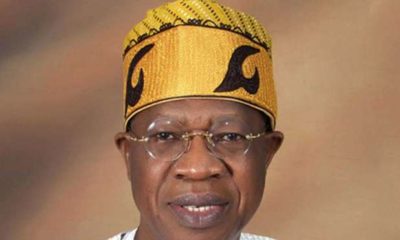Features
Diaspora Chronicles: Why Don’t Nigerians Assimilate?
 I made a fatal mistake that nearly landed me in jail when I newly relocated to North America; I’m too ashamed to even say what it was. Anyway, the reason for my error was that I had based my actions on the advice given to me by a cousin who had lived in America for many years. I believed in the views he had and that almost landed me in hot water! Truth is, it all could have been avoided if I had done just a little research or discussed with the right people. The thing is when you relocate to a new country, there is that tendency to want to hang around your own kind. While this is not a bad thing, you must ensure that, “your people” (whom you take advice from) are knowledgeable. You don’t want to end up asking the wrong people questions.
I made a fatal mistake that nearly landed me in jail when I newly relocated to North America; I’m too ashamed to even say what it was. Anyway, the reason for my error was that I had based my actions on the advice given to me by a cousin who had lived in America for many years. I believed in the views he had and that almost landed me in hot water! Truth is, it all could have been avoided if I had done just a little research or discussed with the right people. The thing is when you relocate to a new country, there is that tendency to want to hang around your own kind. While this is not a bad thing, you must ensure that, “your people” (whom you take advice from) are knowledgeable. You don’t want to end up asking the wrong people questions.
The wrong people could turn out to be fellow Nigerians or fellow town’s men who live around you, or worship in the same church as you. This problem is prevalent as the “I wish we had known this when we first came stories” are many. This aim of this article, therefore, is to stress the need for Nigerians in diaspora to assimilate into the new countries that we now call home.
There is really no way you will succeed as a professional in North America if you do not know what is happening within your chosen profession or you don’t forge bonds with like minds. The Nigerian that will be successful is the one that chooses to assimilate with other professionals in the country regardless of their origin.
A lot of Nigerians like me initially just worked jobs, shifts etc. with the only form of interactions being town meetings or church gatherings. Some of us are not even in PTA meetings of our children’s school. The compulsory parent/teacher meetings are simply not enough to get in sync with your child’s learning environment.
On the home front, some of us do not even interact with neighbours’ unless they are from the same ethnicity. An example of where this is beneficial is when you need help. My Italian neighbour for instance has been picking up my children from school for the last 1 year. It is a mutually beneficial relationship, as my kids are mouthing some good Italian, her kids get to eat some good old Nigerian food. Even more important, she hears my own version of what Nigeria and Nigerians are truly like rather than the adulterated version they pick up elsewhere.
In other spheres of life, we replicate the same attitude as we go to only Nigerian churches, shop only in African stores and attend only gatherings of our people. On the few occasions we attend the gatherings of other ethnic groups, it is because we hope to benefit from the socialization but not because we want to get to know them better. You never see our people at the museums (which most times are free), art galleries, book readings or any cultural enlightening events but call an Owambe and you will see them spending money they don’t have buying the Aso-ebi.
There is a saying that goes “It is the rat in the house that tells the one outside where the dried fish is”. This means that it is someone who has been somewhere for while that will tell the newcomer how things are done. The Caucasians who were born here and have lived here all their lives are a repository of information. Our people still do not know that where you buy your home will determine the school that your children will attend; if you buy in a poor neighborhood, your child will likely end up in a crappy school. Our people still do not know that having too many credit cards is not a plus or means that you have money as this action actually reduces your credit score and means that financing of homes or cars will be expensive for you. These are just a few of the things that you learn from talking to the right people.
I know some may argue that these people do not like to share information but surely if you ask six of them, at least one will give you the information you need. The other five may give you half the information but when you put it all together, you should have something useable.
My view is that if you have decided to call this land your home, the least you can do, is get to know the land and its people. I am derided by Nigerians when I have a party and it is multi-cultural. I get questions like, “what are you always doing with these people?” Sometimes they even try to scare me by warning me to be careful about how I associate with them as “they will show me” and in fact that they don’t really like me but are pretending so they will know my secrets. Let’s get our heads out of the sand and lose the paranoia! If they show me, is it more than the Nigerians have shown me. Have I stopped associating with them? Many of the Americans are so interested in knowing about where we come from and how things work there, but paranoia makes us wonder why they are asking these questions and we quickly shut it down or become taciturn hence making them stop. How can you change their minds when you don’t tell them about the beautiful land you come from instead you leave them to get the biased version from CNN, Fox News, or even Discovery Channel? What stops you from having a New Yam Festival in your home, inviting them to it and educating them on it being our version of Thanksgiving or did you not know that yourself?
For me, I believe in multiculturalism but this does not mean that I do not know who I am or where I am from. My beliefs though should not preclude me to opening my heart to this new land I call home. I assimilate, not because I do not want to still be Nigerian or I want to lose my identity, but I want to better know this land and the people who are my fellow citizens. I assimilate because I want to absorb the decades of knowledge that the older residents of this land have that will help me accomplish what made me move here.
I assimilate because this is home.
***
For more articles like this see our blog – www.diasporachronicles.com; Instagram – @diasporachr; Facebook – diaspora chronicles.
Story written by Kiki Daniel of Diaspora Chronicles.
Photo Credit: Kadettmann | Dreamstime




















